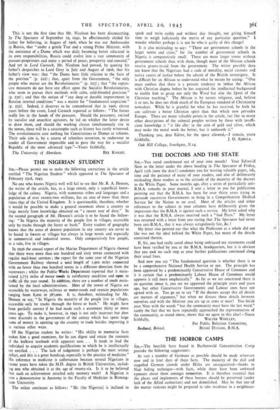THE NIGERIAN STUDENT
Snt,—Please permit me to make the following corrections in the article entitled " The Nigerian Student " which appeared in The Spectator of February 23rd, 5945.
No one who knows Nigeria well will fail to see that Mr. R. A. Henson, the writer of the article, has, to a large extent, only a superficial know- ledge of the colony. Nigeria, with numerous tribes and languages and a population of over twenty-two millions, has an area of more than three times that of the United Kingdom. It is questionable, therefore, whether it would be possible to make a general statement about a country so large merely from knowledge obtained on " a recent tour of duty." In the second paragraph of Mr. Henson's article is to be found the follow- ing: " In Nigeria the majority of the people live in villages, accessible only by tracks through the forest or bush." Every student of geography knows that the areas of densest population in any country are never to be found in forests or villages but always in large towns and especially in commercial and industrial towns. Only comparatively few people, as a rule, live in villages.-
. In 1936 the annual report of the Marine Department of Nigeria showed that-there were more than one hundred and sixty towns connected with regular timid-boat services ; the report for the same year of the Nigerian Government Railway showed a- total-length of 1,900 miles connected with no fewer than two hundred towns in a different-direction &dm the waterways ; whilst the Public-Works Department reported that it main- tained 3,775 miles of motor -mods in satisfactory condition and ,open to traffic all the year round: In addition, there are a number of roads main- tained by. the .local administrations. Most of the towns of Nigeria are accessible by waterways, railways or motor-roads and contain -populations ranging from 8,000 to 387,000. It is, therefore, misleading for Mr. Henson to say, " In Nigeria the majority of the people live in villages, accessible ,only by tracks through the forest or bush." He might have been partially correct if he had made such a statement thirty or more Years ago.. To make it, however, in 1945 is not only incorrect but does some discredit to the government of thi colony which has spent large sums of money in opcning up the country to trade besides improving it in various other ways.
Of the Nigerian student he writes: " His ability to memorise facts makes him a good examinee, for he can digest and retain the contents of the bulkiest textbook with apparent ease. . . It tends to lead the individual to acquire academic qualifications to which he is intellectually not entitled.. . . The lack of judgement is perhaps the most serious defect, and this is a great handicap, especially in the practice of medicine." His reference to medicine is unfortunate because several Nigerians in recent years have taken the M.D. degree in British Universities, includ- ing one who obtained it at the age of twenty-six. Is it to be believed that such an achievement entailed only memory work? A Nigerian is non., a demonstrator in Anatomy in the Faculty of Medicine in Birming- ham University.
The waiter continues as follows: "He (the I4igerian) is inclined to speak and write rashly and without due thought, not giving himself time to weigh judiciously the merits of any particular question." wonder whether perhaps it is not he who is guilty of this charge!
It is also misleading to say: " There are government schools in the larger towns and cities," for the number of government schools in Nigeria is comparatively small. There are more larger towns without government schools than with them, though most of the Mission schools receive grants-in-aid from the government. The writer possibly does not know that the Nigerians had a code of morality, social customs and native courts of justice before the advent of the British sovereignty. It is difficult for an African to understand what he means by saying: "One must confess that there is a present tendency to imbue the African with Christian dogma before he has acquired the intellectual background to enable him to grasp not only the Word but also the Spirit of the Christian teaching." The African is by nature religious, and, believe it or not, he does not think much of the European standard of Christianity nowadays. While he is grateful for what he has received, he feels he can cultivate a better Christian spirit than that which now pervades Europe. There are many valuable points in the article, but like so many other descriptions of the colonial peoples written by those with insuffi- cient knowledge it " is like alio:, in the coin of gold and silver, which may make the metal work the better, but it embaseth it."
Thanking you, dear Editor, for the space allowed,—I remain, yours faithfully, J. 0. ApBOLA. Oak Hill College, Southgate, N.14.


























 Previous page
Previous page